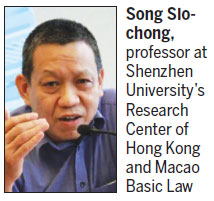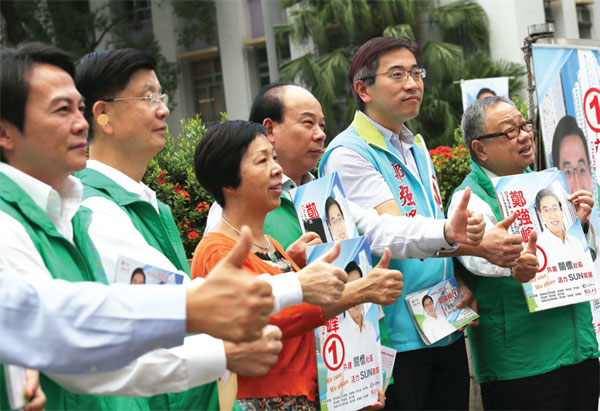Pro-establishment camp 'will prevail' despite opposition smear campaign
Updated: 2015-11-17 07:56
By Luis Liu in Hong Kong(HK Edition)
|
|||||||
|
Members of the Federation of Hong Kong Guangdong Community Organisations canvass support for district council election candidate Cheng Keung-fung (second right) in Kwun Tong on Monday. Cheng will compete with Carol Lam Ho-chun in the Tsui Ping constituency. Parker Zheng / China Daily |
The number of seats held by the pro-establishment camp in district councils may shrink in the coming election due to the opposition's successful tactics of running "anti-vote-planting" campaigns, according to one of the city's leading political commentators, Song Sio-chong.
However, Song believes the camp will still secure a decisive win as the "localist" candidates cannot garner enough public support at the district level.
The opposition has played up the "vote-planting" issue for years. This prompted the government to carry out a dragnet check and disqualify some 47,000 voters. However, although there were several proven cases, Song recalled, there were no real grounds for concern.
"The city's authorities fell into traps set up by the 'pan-democrats'," explained Song, a professor at Shenzhen University's Research Center of Hong Kong and Macao Basic Law.
The large number of invalid voter registrations partly resulted from the city's high housing prices, he said. This meant many living in the lower end of the rental market could not provide a valid residential address since they were living in subdivided flats, Song added.
Many registered using their relatives' addresses before the citywide check. As a result, the majority of them were screened out as they failed the complex data-updating vetting system, Song said.

According to statistics from the Long Term Housing Strategy Steering Committee in 2014, there are 86,400 subdivided flats in Hong Kong. These accommodate an estimated 220,000 people. Concern groups further estimate that the actual figure may stand as high as 300,000 if all residential and industrial units are included.
"The grassroots community, especially underprivileged residents who are covered by the government's poverty-relief net, are more likely to support pro-establishment candidates who care more about their overall well-being," Song noted.
Second, because Hong Kong's once robust economic growth has been slowing down over the past few years while the mainland has grown into the world's second-largest economy, many Hong Kong residents chose to work and live across the border, Song said.
"This accelerated outflow has also taken away a lot of votes from this years' district election," Song said. "Most of them would be in favor of the pro-establishment candidates since they show no antipathy to the mainland," he said.
The pro-establishment camp won more than 300 seats out of 412 constituencies in the last district council election in 2011. This translated into 72.8 percent of the total, whereas opposition candidates only secured 82 seats.
This year, Song believes the legacy from the illegal "Occupy Central" movement will to some extent enlarge the support base of "localist" candidates. However, more voters will turn their backs on them as the majority of residents were disgusted with the disruption caused by the 79-day protest, according to various polls.
luisliu@chinadailyhk.com
(HK Edition 11/17/2015 page7)
